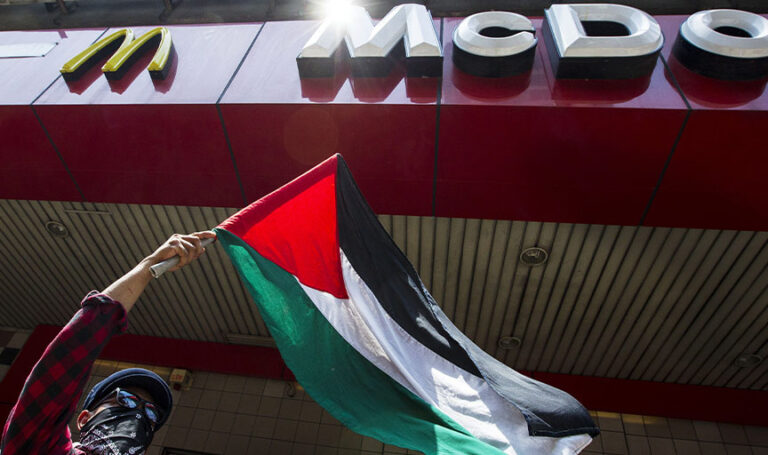McDonald’s, Chick-fil-A, and Starbucks: Getting involved in political conflict is just a fast food thing

While international conflict and fast food don’t appear on the surface to have any clear association, I’ve come to find that, in actuality, they are intrinsically linked to each other, one way or another. As long as there have been politicians and countries at odds, there have been businesses and franchises sticking their oars in.
McDonald’s, aka the biggest fast food chain in the world, is no stranger to international affairs. Journalist Thomas Friedman hypothesised a theory in the mid-90s that he affectionately called the ‘Golden Arches Theory of Conflict Prevention’. In short, the theory suggests that McDonald’s, in the past, has always strategically placed its restaurants in countries that were unlikely to go to war in the first place. Of course, Friedman’s theory was just that, a theory.
So, where does that leave us in situations such as Ukraine and Russia and Israel and Palestine?
An article began circulating recently about how the McDonald’s franchise was falling apart in regard to the mounting escalation of conflict and war in Israel and Palestine. The conflict has so far resulted in thousands of victims, many of whom have been young children, and its political reverberations can be seen and felt across the globe.
Despite McDonald’s originating in the US, it’s become a global powerhouse. Its positioning in certain regional areas is not only economically crucial but also holds great political power. That power, of course, subsequently comes with a mountain of responsibility.
After having pledged to provide free meals to soldiers in the Israel Defense Forces (IDF), a number of McDonald’s restaurants based in Muslim countries denounced the move and issued a joint statement emphasising their support of Palestine and distancing themselves from the Israeli branch, as reported by Reuters.
While some have pointed out the fact that a majority of McDonald’s restaurants operate independently and that the decision to serve IDF soldiers was not a cohesive corporation decision, the damage for a lot of people is already done. These political conflicts, particularly the Israel and Palestine situation, have incredibly deep intricate roots. And so, despite any claims of individual autonomy, when one branch makes a statement that’s deemed as wrong or perhaps embedded with Western persuasion, the entire company faces blame.
ABC News did report that to support people in the region, McDonald’s made a $1 million donation split evenly between the Red Cross and The World Food Programme.
It would also be foolish to undermine or underestimate the sociopolitical dominance of a company such as McDonald’s. It’s been one of the US’ most important soft powers.
While there have been countless examples of McDonald’s branches staying open and serving citizens on both sides of an international conflict, I think it’s the explicit nature of the Israeli branch reaching out to offer free meals to IDF soldiers which has ultimately hit a nerve and thereby resulted in the boycott.
A difficulty for some is the fact that when Russia launched its campaign of bombings and air strikes against Ukraine, McDonald’s almost immediately removed all of its branches from Putin’s sights—something that definitely made a clear statement as to where the company’s loyalties lay. While the situation in Israel and Palestine is undoubtedly less clear-cut, so much incessant pain and harm is taking place that people understandably want to direct their anger towards any corporations who may be, either intentionally or unintentionally, supporting who they believe to be the aggressor.
Interestingly enough, when McDonald’s said ‘see ya’ to Russia, the chain was simply replaced by a new fast food venture called Vkusno & Tochka, which translates to “Tasty and that’s it.” Not as catchy, but oh well. It should also be noted that, despite pledging to leave the country, Burger King still remains a firm staple in the Russian fast food scene.
McDonald’s is of course not the only fast food chain to very publicly put its foot in one camp or another. For example, Chick-fil-A has been heavily boycotted by a number of LGBTQIA+ individuals due to its extensive connections with highly discriminatory and homophobic groups. In 2017, the company’s foundation donated $1.8 million to three different groups that have records of anti-LGBTQIA+ discrimination and rhetoric.
And we can’t forget about Starbucks stripping a number of its stores in the US of any Pride memorabilia or decorations—it really said ‘don’t say gay’ with that one.
In fact, Starbucks is probably one of the most political drinks and food chains out there. Despite going out of its way to not donate to political issues or causes, the corporation frequently interjects with individual branches’ own activism. Oh, and don’t even get me started on the company’s beef with unionising.
With a ceasefire so far out of reach, these conversations regarding corporations’ involvement in international conflict will undoubtedly continue. And while it isn’t a case of laying blame on one particular company or individual decision, we also shouldn’t downplay the global impact a company as influential as McDonald’s can have.





